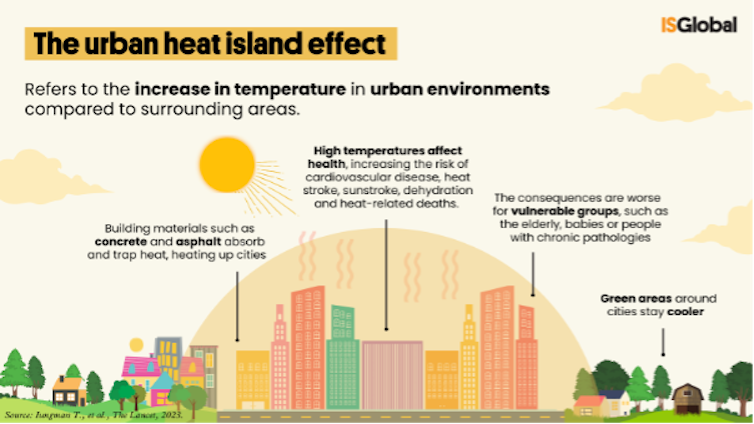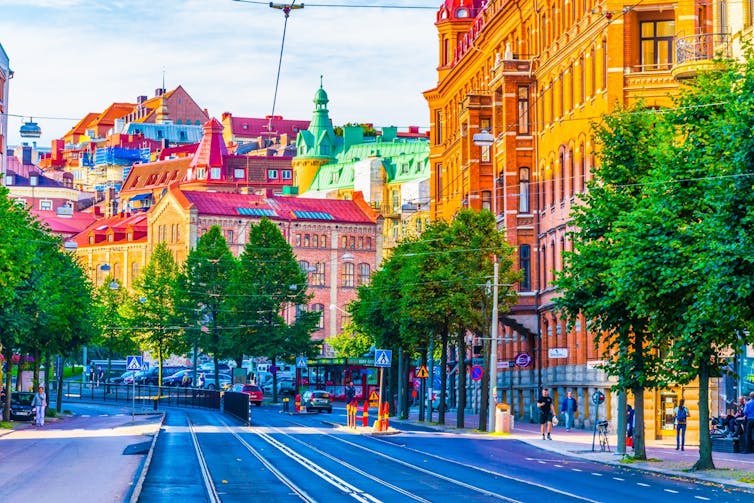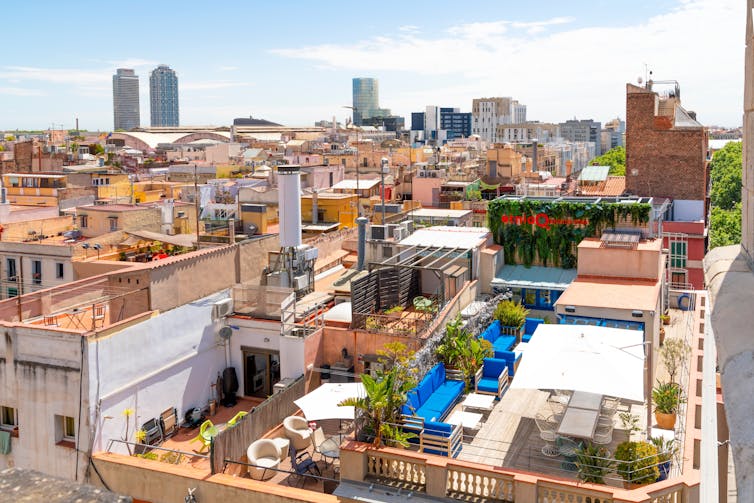Tree planting may reduce premature deaths in European cities PHOTO
The Conversation academic journal has published an article arguing that planting trees in urban areas can reduce the impacts of urban heat islands on human health. Caliber.Az reprints the article.
Urban development leads to fewer shaded areas and more heat-absorbing paved surfaces. Cities tend to be warmer than their rural surroundings as a result, a phenomenon known as the urban heat island (UHI) effect. During the summer daytime, cities can be up to 12℃ hotter than rural areas.
UHIs are a major environmental hazard for urban dwellers. Research suggests that for each 1℃ rise in temperature, the risk of death increases by between 1 per cent and 3 per cent. Heat exposure also increases the risk of suffering cardiovascular and respiratory illnesses.
Our research calculated the death rates of urban inhabitants across 93 European cities (57 million people in total) between June and August 2015. We found that 6,700 premature deaths during this period were linked to UHIs.
But the pace of global warming is accelerating and 2–3 billion people are expected to live in cities by 2050. The health impacts of UHIs will likely worsen in the coming years.
Several strategies exist to protect urban residents from the impacts of heat. These include covering roofs and facades in vegetation (green roofs), decorating them in lighter colours, and replacing paved surfaces with areas of vegetation. Our modelling revealed that one-third (2,644) of UHI deaths in Europe could be prevented by increasing tree canopy cover to 30 per cent in every urban neighbourhood.

Urban tree guidelines
This target was established last year by a study published in the Journal of Forestry Research. Since then it has been adopted by several cities worldwide, including Barcelona (Spain), Bristol (UK), Philadelphia (US), Canberra (Australia) and Seattle (US).
Urban forests regulate a city’s microclimates effectively. Research found that urban forests cooled the average temperature of 601 European cities by 1.1°C and by as much as 2.9°C.
Leafy neighbourhoods are also linked to improved mental and physical health. In California, a 10 per cent increase in neighbourhood tree cover has been associated with a 19 per cent reduction in rates of obesity and type 2 diabetes.
Surrounding greenness, particularly greenness at schools, can be important in the cognitive development of children. Cognitive testing of schoolchildren in Barcelona revealed a 6 per cent better working memory development in children at schools with the highest levels of greenness compared to those at the least-green schools.
More trees means less heat
We found substantial variation in UHI death rates across European cities. In 2015, Gothenburg in Sweden recorded no premature UHI deaths, while urban heat was responsible for 32 premature deaths per 100,000 people in the Romanian city Cluj-Napoca.
The cities with the highest UHI death rates were in southern and eastern Europe. Most of these cities generally had low tree coverage and recorded the highest UHI effect.
Just 3.3 per cent of Thessaloniki in Greece is covered by trees, resulting in urban temperatures 2.8℃ higher than the surrounding area. By contrast, 27 per cent of Gothenburg is covered by trees, delivering an UHI effect of just 0.4℃.
Overall, southern European cities will benefit most from increasing their tree cover. Our model estimates that Barcelona could reduce its UHI death rate by 60 per cent by meeting the 30 per cent tree coverage target.

The way forward
But the intensity of the UHI effect depends on multiple factors and is specific to each city. While vegetation cover influences urban temperatures during the day, nighttime temperatures are driven by the height of the urban canyon.
The cooling capacity of a tree canopy also varies. This depends on the type and size of trees, which are themselves contingent on the city’s natural climate and the degree to which trees are maintained.
Drier climates, like Thessaloniki, favour smaller trees that have fewer leaves. By contrast, Gothenburg’s cooler and wetter climate favours larger and leafier trees that provide better protection from daytime heat.
Due to this variation, we built a tool called the Cooling Efforts Index. The index assesses how much cooling can be achieved in each city for every 1 per cent increase in tree cover. We also generated high-resolution maps for each city to identify the areas where tree coverage is needed most urgently.
In some cities, the majority of urban forests will grow on private land. Tree planting programmes must therefore encourage residents to plant trees.
In Victoria, a city on Canada’s western coast, neighbourhoods are offered a CAD$1,000 (£610) grant to plant residential trees. So far, over 78 trees have been planted on private property across the city.
Space can also be a major constraint in compact urban areas. So increasing tree cover to 30 per cent may be challenging for some European cities.
But each city can adapt this target to its local context. For example, a lower tree canopy target can be combined with alternative measures like green roofs in compact urban areas.
Terrace roofs account for 67 per cent of Barcelona’s roof surface area. As the city’s urban population continues to rise, the city council has launched a guide to transform roofs into areas with partial or total plant cover. The guide sets out the social and environmental benefits of green roofs and offers advice for choosing the right kind of terrace roof for the building.

Incorporating urban green infrastructure into cities should make them more resilient to climate change. But planting trees may not be enough. Tree growth is a long processes and around half of newly-planted trees die within two years. Preserving existing trees and complementing tree planting schemes with other measures that reduce the intensity of UHIs, such as reducing car use, are similarly important.
Urban trees provide substantial public health and environmental benefits. Our study suggests that by increasing tree coverage, premature UHI deaths in European cities can be reduced. But for the resilience of cities to increase, it remains important to combine greater tree coverage with other urban green infrastructure.








